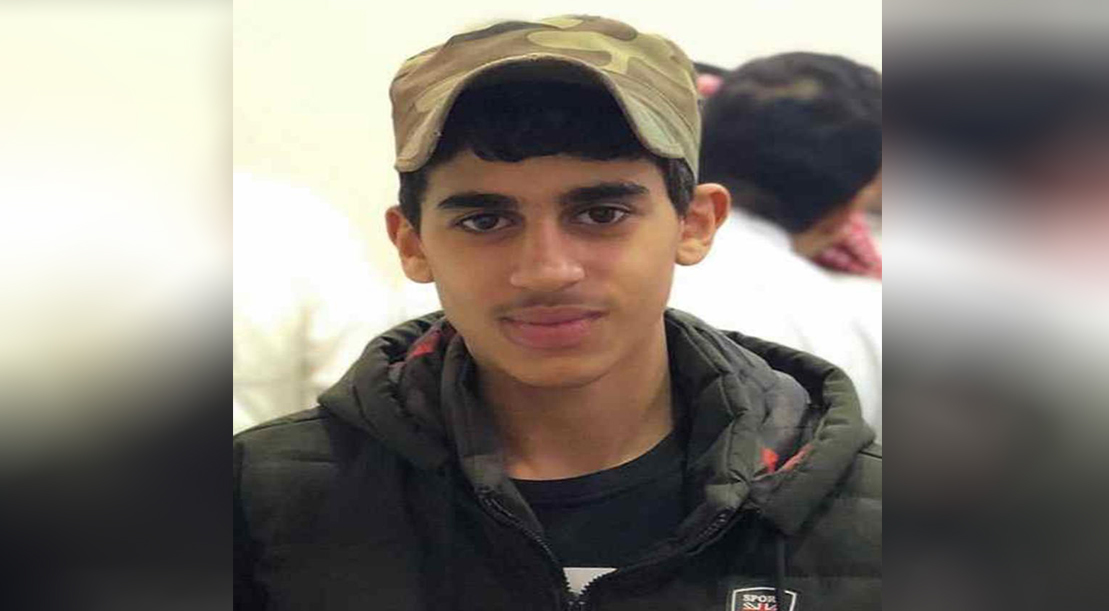Haider Jaafar Khair was a high school student when he was arrested at his family’s house. His arrest was warrantless, and, before his trial, Haider was constantly transferred between locations. His lawyer was not present during his interrogation and he was subjected to an unfair trial. He remains in the New Dry Dock Detention Centre.
On 18 January 2019, Haider was arrested in his family home by officers in civilian clothing, including officers from the: riot police, Security Police Forces, Criminal Investigations Directorate and Special Security Forces. At 4:00 am, officers raided Haider’s home by breaking down doors and the street was surrounded by cars. They arrested Haider and confiscated his mobile phone, not providing any arrest warrant or official document. hey also failed to provide any reason for the arrest.
Haider’s family discovered the reason for Haider’s arrest from the Public Prosecution Office (PPO); Haider’s lawyer informed the family that he was charged with transferring money to unknown places and abusing the use of social media.
Haider was subjected to enforced disappearance and his family did not know his location until the next day of his arrest. On 19 January 2019 they received a call from Haider: he told them that he was fine and at the Criminal Investigations Directorate (CID). Following this, they did not hear any news about him; even when they asked the authorities about Haider, they did not receive any information. Twelve days after his first call, the authorities finally notified Haider’s family that he was at the Dry Dock Detention Center. Haider was only able to contact his family on 30 January 2019.
Haider was charged for detonating or attempting to detonate a bomb, joining a terrorist group, and receiving, transferring and delivering funds for a terrorist group. On 27 January 2019, the PPO decided to detain Haider for 6 months of pre-trial detention in the Dry Dock Detention Center. On 25 July 2019, the High Criminal Court extended this duration for an additional 15 days starting from 26 July 2019 on the allegations of misbehaving. On 28 January 2020 the Fourth High Criminal Court issued a judgement sentencing Haider to three years in prison and a fine of one thousand Bahraini’s dinars. On 30 March 2020 the Court of Appeals upheld the judgement. Haider’s family made a request for the judgment to be heard before the Court of Cassation, but the trial did not occur yet.
Haider was only able to meet with his lawyer during court hearings and he did not have adequate time nor facilities to prepare for trial. Furthermore, Haider was not able to present evidence and challenge evidence presented against him. His family reported that he was brought before a judge on 27 January 2019, 9 days after his arrest.
Haider was interrogated for several days and his lawyer was not allowed to attend his trial. Haider was transferred several times between the CID and other unknown locations. He was handcuffed while transferred and was also insulted and the victim of inappropriate and indecent language. Haider was not subjected to torture, but he was prohibited from freely performing religious rituals. He confessed to the charges against him and admitted that he transferred and delivered money to a member of the terrorist cell three times; he also sent videos and photos using Instagram.
Haider remains in the New Dry Dock prison (for convicts under 21 years old in Dry Dock Detention center but under the administration of Jau Prison).
Haider’s treatment is in violation of Bahrain’s international human rights obligations, including the International Covenant on Civil and Political Rights (ICCPR) and the Convention Against Torture and Other Cruel Inhuman or Degrading Treatment or Punishment (CAT). Warrantless arrest and inappropriate language to which Haider has been subjected to, as well as the fact that he was subjected to enforced disappearance and not promptly brought before a judge are in violation of Articles 7, 9, 10, 14, 18 and 19 of the ICCPR. Finally, Haider has been prohibited to enjoy his own religion which constitutes a violation of Article 27 of the ICCPR. Haider was subjected to inappropriate and indecent language which constitutes a violation of the CAT.
Americans for Democracy & Human Rights (ADHRB) calls on the government for any retrial to be conducted in accordance with international standards for a fair trial.





